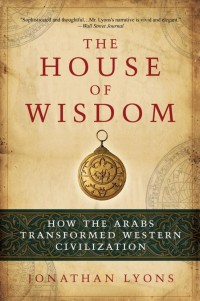The House of Wisdom: How the Arabs Transformed Western Civilization

 By Jonathan Lyons
By Jonathan Lyons
Published by Bloomsbury Press, New York, 2009 Click to Buy this Book!
In the Prologue of The House of Wisdom, titled Al-Maghrib/Sunset, author Jonathan Lyons introduces the central themes that are carried throughout the entire book with unceasing intellectual vigor: “The power of Arab learning, championed by Adelard of Bath [c. 1080–1152], refashioned Europe’s intellectual landscape. Its reach extended into the sixteenth century and beyond, shaping the groundbreaking work of Copernicus and Galileo … Averroes, the philosopher-judge from Muslim Spain, explained classical philosophy to the West and first introduced it to rationalist thought. Avicenna’s Canon of Medicine remained a standard European text into the 1600s. Arab books on optics, chemistry, and geography were equally long-lived. The West’s willful forgetting of the Arab legacy began centuries ago, as anti-Muslim propaganda crafted in the shadow of the Crusades began to obscure any recognition of Arab culture’s profound role in the development of modern science.” A Note to Readers explains the structure of The House of Wisdom, “which pays tribute to the success of Arab scholars in measuring out the ever-changing pattern of night and day that determines the times of the five daily Muslim prayers. The book begins at sunset (al-maghrib prayer), the traditional start of the day in the Middle East; then moves through the nightfall (al-isha) of the Christian Middle Ages; recounts the dawn (al-fajr) of the great age of Arab learning; soars toward the glory of midday (al-zuhr) with our central hero, Adelard of Bath, in the Near East; and concludes with the rich colors of afternoon (al-asr) that mark the end of the Age of Faith in the West and the seemingly unstoppable triumph of Reason.” The four parts that follow the Prologue contain nine chapters. The book is not written in precise chronological order, but there is a chronological listing of Significant Events at the beginning, in addition to a list of Leading Figures, e.g., Albumazar, Boethius, Michael Scot, Ptolemy, Siger de Brabant, and Thomas Aquinas.
The House of Wisdom has a certain quality that is difficult to define and this is most likely due to its unusual structure and underlying tone of reverent enthusiasm, as well as the long, absorbing, even magical journey that it offers through heretofore unfamiliar perspectives of history, that is, from the Westerner’s point of view. Praise for The House of Wisdom includes such descriptions as “sophisticated and thoughtful; vivid and elegant; refreshing; new and important; treasure trove of information; lively and well-researched; highly recommended; complex and fascinating; riveting, breakneck pace; wonderful; clear and accessible; complex, humane and intricately beautiful.” From the Guardian: “In this clear and well-written book, Jonathan Lyons delves into all sorts of musty corners to show how Arabic science percolated into the Latin world in the Middle Ages and helped civilize a rude society.” None of this praise is exaggerated, and all reviewers would agree: educational renewal for deepening understanding of Arab history, Islam and the Muslim way of life is essential and critical in our time, in this second decade of the 21st century and far beyond. It is hard to imagine anyone more capable than Jonathan Lyons of facilitating this process. When the initial readings of The House of Wisdom are completed, it can serve as a first-rate reference book that will never become outdated. More »